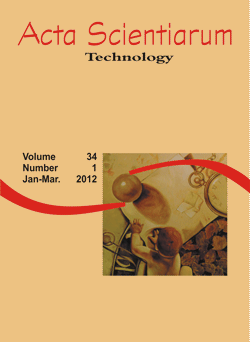<b>Self-organizing maps as a chemometric tool for aromatic pattern recognition of soluble coffee</b> - doi: 10.4025/actascitechnol.v34i1.10892
DOI:
https://doi.org/10.4025/actascitechnol.v34i1.10892Palavras-chave:
self organizing maps, soluble coffee, electronic noseResumo
The electronic nose (EN) is an instrument very used for food flavor analysis. However, it is also necessary to integrate the equipment with a multivariable pattern recognition system, and to this end the principal component analysis (PCA) is the first choice. Alternatively, self-organizing maps (SOM) had been also suggested, since they are a nonlinear and reliable technique. In this study SOM were used to distinguish soluble coffee according to EN data. The proposed methodology had identified all of the seven coffees evaluated; in addition, the groups and relationships detected were similar to those obtained through PCA. Also, the analysis of network weights allowed gathering the e-nose sensors into 4 groups according to the behavior regarding the samples. Results confirm SOM as an efficient tool to EN data pos-processing, and have showed the methodology as a promising choice for the development of new products and quality control of soluble coffee.
Downloads
Downloads
Publicado
Como Citar
Edição
Seção
Licença
DECLARAÇíO DE ORIGINALIDADE E DIREITOS AUTORAIS
Declaro que o presente artigo é original, não tendo sido submetido í publicação em qualquer outro periódico nacional ou internacional, quer seja em parte ou em sua totalidade.
Os direitos autorais pertencem exclusivamente aos autores. Os direitos de licenciamento utilizados pelo periódico é a licença Creative Commons Attribution 4.0 (CC BY 4.0): são permitidos o compartilhamento (cópia e distribuição do material em qualqer meio ou formato) e adaptação (remix, transformação e criação de material a partir do conteúdo assim licenciado para quaisquer fins, inclusive comerciais.
Recomenda-se a leitura desse link para maiores informações sobre o tema: fornecimento de créditos e referências de forma correta, entre outros detalhes cruciais para uso adequado do material licenciado.



















